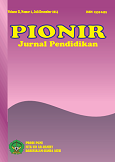RISK MANAGEMENT IN STUDENT MANAGEMENT: EFFORTS TO IMPROVE THE QUALITY OF EDUCATION AT MI MANBA'UL HUDA BANDUNG CITY
DOI:
https://doi.org/10.22373/pjp.v13i2.24942Keywords:
Risk Management, Students, Quality of EducationAbstract
Based on data obtained from the Programe for International Student Assessment (PISA) in 2022 regarding the decline in the quality of education in Indonesia, which is reviewed from literacy, numeracy, and science competencies. In line with that, MI Manba'ul Huda has a goal in improving the quality of education through student management. Challenges and risks in making it happen are always there. Therefore, it is important for him to implement risk management in the institution. To conduct a risk management analysis on student management at MI Manba'ul Huda, the researcher used a qualitative descriptive method. Furthermore, the data obtained was through interviews with school principals, several educators, and education staff, in addition to which the researcher made direct observations at the school. The result of this study is that MI Manba'ul Huda has a strategy and mitigation in its efforts to overcome risks. As for other situations, these schools can accept the risks that occur to avoid greater risks.
Keywords: Risk Management, Students, Quality of Education.
References
Arifudin, O. U. W. F. D. R. (2020). Manajemen Risiko (I). Widina.
Aristawati, N., & Hidayat, W. (n.d.). Identifikasi Risiko Strategis Dalam Meningkatkan Mutu Pendidikan (Penelitian di SMP Al-Hasan Kabupaten Bandung). Educational Leadership: Jurnal Manajezmen Pendidikan, 3(2).
Arta, I. P. S. D. G. S. I. K. B. Y. L. (2021). Manajemen Risiko Tinjauan Teori dan Praktis (Cetakan Pe). Widina Bhakti Persada Bandung.
Dewi, I. A. M. S. (2019). Manajemen Risiko (I. G. A. Mahayasa (ed.); Cetakan Pe). UNHI Press.
Fitri, T., & Hidayat, W. (2023). Strategi Penerapan Manajemen Risiko dalam Meningkatkan Minat Belajar Siswa di SMK Muhammadiyah 1 Kadungora. TA’LIM: Jurnal Pendidikan Agama Islam Dan Manajemen Pendidikan Islam, 2(02).
Istiningrum, A. A. (2011). Implementasi penilaian risiko dalam menunjang pencapaian tujuan instansi pendidikan. Jurnal Pendidikan Akuntansi Indonesia, 9(2).
Munawwaroh, Z. (2017). Analisis Manajemen Risiko pada pelaksanaan program pendidikan dalam upaya meningkatkan mutu pendidikan. Jurnal Administrasi Pendidikan, 24(2).
Perajaka, M. A., & Ngamal, Y. (2021). Pentingnya Manajemen Risiko dalam dunia Pendidikan (Sekolah) Selama dan Pasca Covid-19. Jurnal Manajemen Risiko, 2(1).
Pertiwi, Y. E., & Susanty, A. (2017). Analisis strategi mitigasi resiko pada supply chain CV Surya Cip dengan House of Risk model. Industrial Engineering Online Journal, 6(1).
Pradesa, H. A., Purba, C. O., & Priatna, R. (2021). Menilai risiko dari organisasi yang bertransformasi: pelajaran terbaik untuk penguatan akuntabilitas pendidikan tinggi di Indonesia. Jurnal Akuntabilitas Manajemen Pendidikan, 9(2).
Rosyada, I., Setiawan, F., Rimadhani, M. I., & Rohmadani, A. I. (2022). Manajemen Risiko dalam Meningkatkan Mutu Pendidikan di MTs Muhammadiyah Sanden. Masaliq, 2(2).
Siahaan, H. (2007). Manajemen Risiko: Konsep, Kasus, dan Implementasi (R. L. Toruan (ed.); I). PT Elex Media Komputindo.
Sriyono. (2019). Buku Ajar Pengantar Manajemen Resiko. UMSIDA PRESS. https://doi.org/10.21070/2019/978-602-5914-79-9
Wibowo, A. (2022). Manajemen Resiko (J. T. Santoso (ed.)). Yayasan Prima Agus Teknik.
Downloads
Published
Issue
Section
License
- Authors retain copyright and grant the journal right of first publication with the work simultaneously licensed under a Creative Commons Attribution License that allows others to share the work with an acknowledgment of the work's authorship and initial publication in this journal.
- Authors are able to enter into separate, additional contractual arrangements for the non-exclusive distribution of the journal's published version of the work (e.g., post it to an institutional repository or publish it in a book), with an acknowledgment of its initial publication in this journal.
- Authors are permitted and encouraged to post their work online (e.g., in institutional repositories or on their website) prior to and during the submission process, as it can lead to productive exchanges, as well as earlier and greater citation of published work (See The Effect of Open Access).

